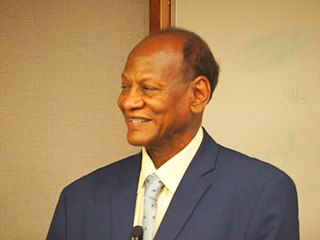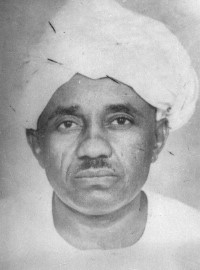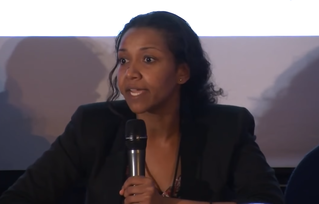
The rich and varied music of Sudan has traditional, rural, East African roots, and also shows Arabic, Western or other African influences, especially on the popular urban music from the early 20th century onwards. Since the establishment of big cities like Khartoum as melting pots for people of diverse backgrounds, their cultural heritage and tastes have shaped numerous forms of modern popular music. In the globalized world of today, the creation and consumption of music through satellite TV or on the Internet is a driving force for cultural change in Sudan, popular with local audiences as well as with Sudanese living abroad.

The Sudan Liberation Movement/Army is a Sudanese rebel group active in Darfur, Sudan. It was founded as the Darfur Liberation Front by members of three indigenous ethnic groups in Darfur: the Fur, the Zaghawa, and the Masalit, among whom were the leaders Abdul Wahid al Nur of the Fur and Minni Minnawi of the Zaghawa.

Hafez Ibrahim was a well known Egyptian poet of the early 20th century. He was dubbed the "Poet of the Nile", and sometimes the "Poet of the People", for his political commitment to the poor. His poetry took on the concerns of the majority of ordinary Egyptians, including women’s rights, poverty, education, as well as his criticism of the British Empire and foreign occupation.
Sudanese literature are both oral as well as written works of fiction and nonfiction that were created during the cultural history of today's Republic of the Sudan. This includes the territory of what was once Anglo-Egyptian Sudan, the independent country's history since 1956 as well as its changing geographical scope in the 21st century.

Leila Aboulela is a fiction writer of Sudanese origin, who lives in Great Britain and writes in English. She grew up in Sudan's capital, Khartoum, and since 1990, has mainly lived in Aberdeen, Scotland.

Mostafa Sid Ahmed, also spelled Mustafa Sayyid Ahmad, was a popular Sudanese singer-songwriter and composer, active from the late 1970s onwards until his death in 1996. During his lifetime, he released more than a hundred songs. According to an article published during the Sudanese revolution of 2018/19, he was remembered "for performing a selective and expressive type of lyrics that touches upon the causes of ordinary and deprived people."

Bushra Elfadil is a Sudanese writer, living in Saudi Arabia. He has published several collections of short stories and novels in Arabic, with some of his stories translated into English, for example as part of anthologies of contemporary fiction from Sudan. In 2017, he was awarded the Caine Prize for African Writing.
Mohammed Abdul-Hayy or Muhammad Abd al-Hayy was a member of the first generation of post-colonial Sudanese writers and academics. Together with Ali El-Mak and Salah Ahmed Ibrahim, he is regarded as a pioneer of modern poetry in Sudan.

Salah Ahmed Ibrahim, was a Sudanese literary writer, poet and diplomat. He is considered one of the most important Sudanese poets of the first generation after the country's independence.

Al-Harith ibn Abi’l-ʿAlaʾ Saʿid ibn Hamdan al-Taghlibi (932–968), better known by his nom de plume of Abu Firas al-Hamdani, was an Arab prince and poet. He was a cousin of Sayf al-Dawla and a member of the Hamdanid dynasty, who were rulers in northern Syria and Upper Mesopotamia during the 10th century. He served Sayf al-Dawla as governor of Manbij as well as court poet, and was active in his cousin's wars against the Byzantine Empire. He was captured by the Byzantines in 959/962 and spent several years at their capital, Constantinople, where he composed his most famous work, the collection of poems titled al-Rūmiyyāt (الروميات). He was ransomed in 966, and was killed in 968, when he raised a revolt against his nephew Sa'd al-Dawla, Sayf al-Dawla's successor. He is considered among the greatest figures of classical Arabic poetry.
Nur Kasih is a 2009 Malaysian TV drama series directed by Kabir Bhatia for TV3. It starred Tiz Zaqyah, Remy Ishak, Fizz Fairuz, Sharifah Sofia and Jalaluddin Hassan. The series was later continued in a film by the same name two years later in 2011.

Mahmoud Mohammed Taha, also known as Ustaz Mahmoud Mohammed Taha, was a Sudanese religious thinker, leader, and trained engineer. He developed what he called the "Second Message of Islam", which postulated that the verses of the Qur'an revealed in Medina were appropriate in their time as the basis of Islamic law, (Sharia), but that the verses revealed in Mecca represented the ideal religion, would be revived when humanity had reached a stage of development capable of accepting them, ushering in a renewed Islam based on freedom and equality. He was executed for apostasy for his religious preaching at the age of 76 by the regime of Gaafar Nimeiry.

Taban Deng Gai is a South Sudanese politician who has been one of the Vice Presidents of South Sudan in the unity government since February 2020. He served as the First Vice President of South Sudan from 23 July 2016 to February 2020. He was mining minister before being appointed as acting first vice president.

Emtithal "Emi" Mahmoud is a Sudanese-American poet and activist, who won the 2015 Individual World Poetry Slam championship. In 2018, she became UNHCR Goodwill Ambassador, and in this capacity, has traveled to refugee camps in Kenya, Greece and Jordan, drawing wider attention to the situation of refugees.
The Hamaj Regency was a political order in the region of modern-day central Sudan from 1762 to 1821. During this period the ruling family of the Funj Sultanate of Sennar continued to reign, while actual power was exercised by the regents.
Kaduna Book and Arts Festival, also known as KABAFEST, is an annual literary, cultural, and art event in Kaduna State, Nigeria that took place for the first time in July, 2017. It was organized by Book Buzz Foundation, who also organizes the annual Aké Arts and Book Festival, in collaboration with the Kaduna State Government and the Gusau Institute. It was also the first book festival that occurs annually in northern Nigeria.

Nahla Mahmoud is a Sudanese-born British writer, ex-Muslim, secularist, environmentalist, and human rights activist, and spokesperson for the Council of Ex-Muslims of Britain. She fled to the United Kingdom in 2010.

Gerasimos Antonios Contomichalos was the most eminent business magnate in the Anglo-Egyptian Sudan and the greatest benefactor of the Greek community in Sudan. He wielded considerable political influence both in Sudan and Greece.
Nur is a 2018 Malaysian television drama series directed by Shahrulezad Mohameddin, starring Amyra Rosli as the titular role and Syafiq Kyle as Ustaz Adam. The series focuses on the relationship between a pious man and a prostitute who practices her faith in an unconventional manner. The premiere episode garnered 11 million viewers and became a controversy during its run. The series premiered on TV3 from 14 May 2018 to 14 June 2018 during the Ramadhan. A sequel, Nur 2 was aired in 2019, after the success of the prequel.
Muhammad Taha Al-Qaddal was a Sudanese poet. He wrote Arabic lyric poetry in contemporary Sudanese style, and some of his poems were put to music by popular Sudanese singers. Al-Qaddal began his literary career at the end of the 1960s and became known in the early 1980s by expressing social and political messages through his verses. His poetry found special resonance during the Islamist military governments of the late 1990s and has been popular beyond the Sudanese revolution of 2018/19.













